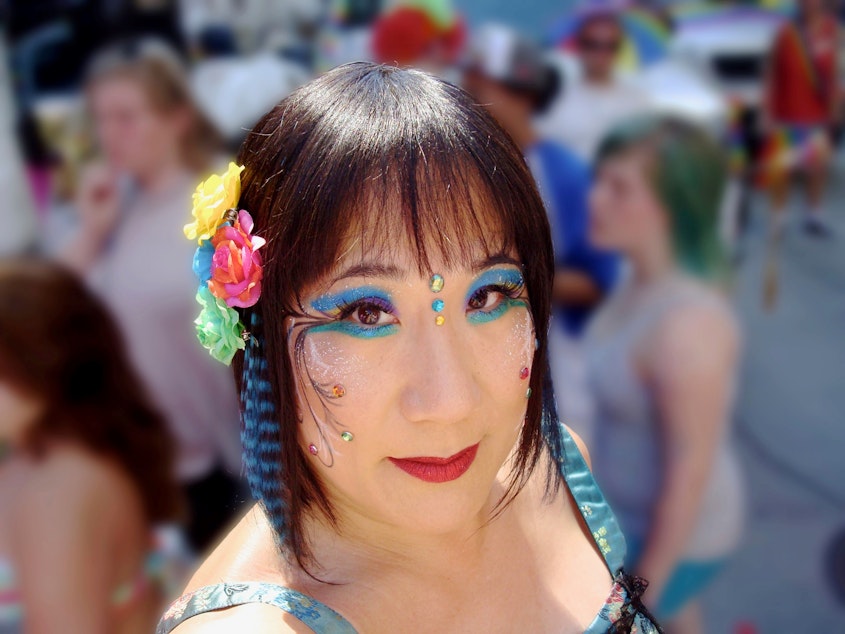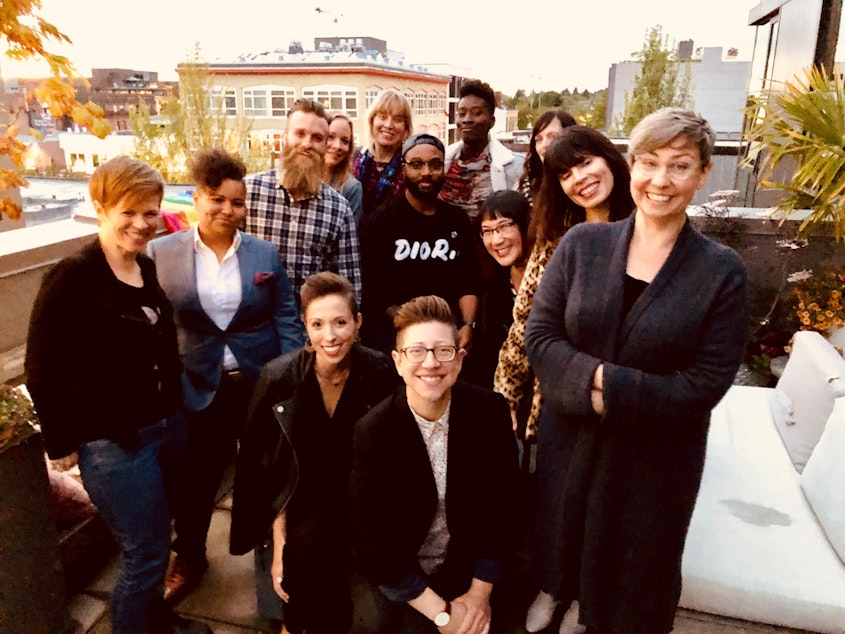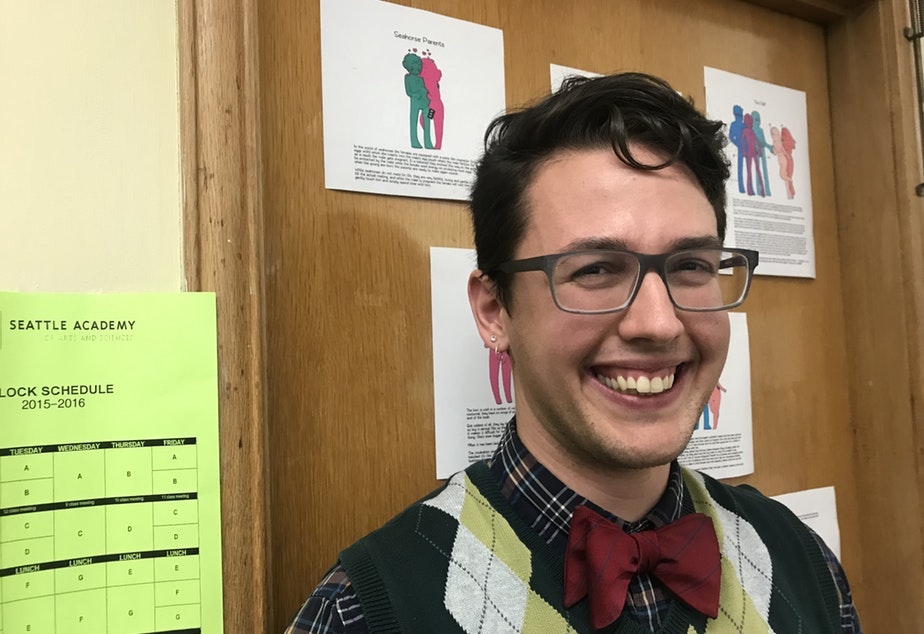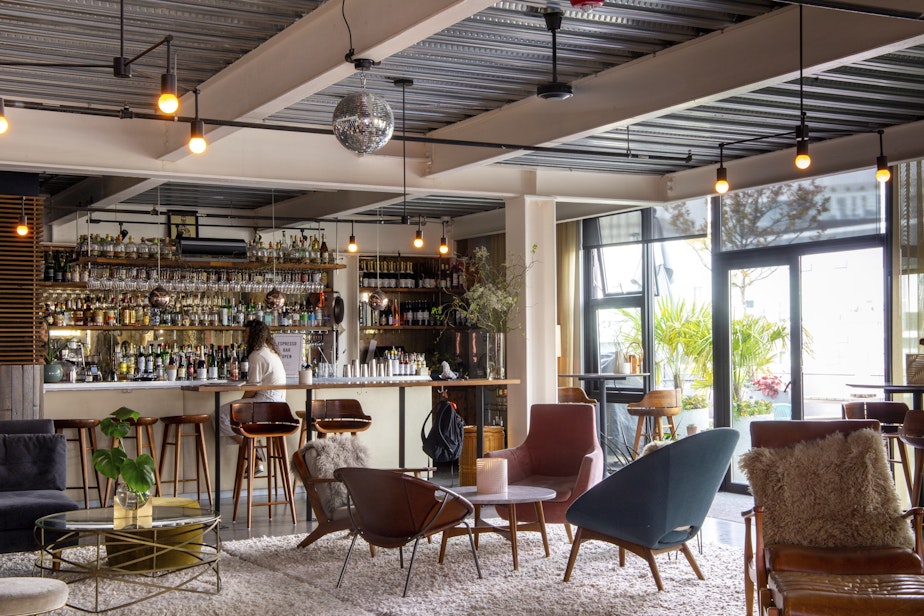Should an Asian transgender woman say she's 'passing?' Food for thought at KUOW's Queeriosity Club
When Ginger Chien joined for KUOW's queer supper club, she wasn't expecting to question her own vocabulary or end the night by suggesting a slumber party.
On June 6, storyteller and engineer Ginger Chien and eight other community members joined KUOW journalists and producers for Queeriosity Club, KUOW's first Pride-themed Curiosity Club dinner party at The Cloud Room on Capitol Hill.
Below, Ginger Chien reflects on what she's learned from touring with her queer rock back and joining a group of strangers for a dinner party.
Sponsored
Unfamiliar social spaces are challenging for me.
I’m transgender and I carry with me a constant wariness of whether my conversational encounters with someone new at a social event might suddenly turn in an unwanted direction when someone learns or suspects that I’m transgender.
The fact that I’m a tail-end baby boomer means that my peers are not quite as gender-savvy as Gen Z. Queeriosity Club offered a unique opportunity to enter a space where I could engage in conversations without my usual concerns.
I relish good conversations that head down rabbit holes of biology, emotional intelligence, language, gender, social implications of technology, psychology, civil rights — you name it, I’ll go there.
I especially like conversations where I can find a question that sometimes lets someone open a door to their soul, to bittersweet memories or a contemplative pause in a moment of realization.
Sponsored
Queeriosity Club's dinner guests reminded me that my default assumptions about culture are narrow.
Sitting across from me was Jeffrey, the man of Mormon background seeking faith and community on his own terms while occasionally adding mascara to his dramatic coif and immense beard.
On my left was Mellina, the dapper woman of color who writes about conservative ideas and healing social division.
On my right was Timothy, the cultural transformer and an unpretentious source of wisdom and insights shaped by a life very different than mine.
Sponsored
All around me were Seattle transplants with Southern roots. I was surprised by the number of people in our group with deep connections to the South, a region on which I hold many biases.
My experiences in rural Washington playing with my transgender band showed me that not all rednecks are as I imagine them, but that they can be capable of sensitivity and acceptance when I help them see me as a person. That requires risk on my part, but I understand my responsibility in this and that I would be hypocritical if I were to only expect people to move closer to where I stand.
Watch Ginger's five-minute Ignite talk that she delivered in Seattle the night before Queeriosity Club: A Transgender Band Walks into a Rural Olympic Peninsula Bar...

'Passing' and the complexity of race, gender, and language.
Sponsored
As a storyteller, I occasionally share about the dangers around being transgender.
Wrapped up in that complex dynamic of wishing to be seen for my dignity and simultaneously wishing to be invisible for my safety, is this troublesome term known as “passing.” In the transgender community, passing refers to being visibly normative according to the gender of your identity and thus free from the risk of anti-transgender violence.
At one point in our evening’s conversation a woman spoke of growing up in a somewhat hippie household with unconventional clothes and her later efforts at finding the right clothes to “pass” as just another one of her friends.
One Queeriosity Club member politely interrupted her saying, “I think this is a safe space,” and then explained that the term “passing” is rooted first in race where very fair skinned people of color would “pass” as white people to avoid oppression. It was noted that for some, passing was attempted out of shame of their race.
Sponsored
In that moment, I was reminded that this is a term I commonly use, rooted in my own negative experiences of what happens when I am read as transgender. This conversation made me realize that my use of this term deserves reconsideration.
This Club member offered the alternative of “fitting in.” This suggestion reminded me that I can be compassionate in my word choices too.

What I’ll take with me from Queeriosity Club.
Our conversation about Ann Dornfeld’s piece about the transgender teacher stood out for me.
The world was very starkly gendered when I was growing up in the 1960s. I had always searched for room between or across genders in some way to give me the sense of place that I was not feeling within the roles that were offered to me.
It would have been transformative to have a transgender teacher in my world. I experienced similar coming-out fears that the teacher describes, based on my own set of cultural expectations. I see now that those fears all come down to the fear of being alone or the fear of dying.

In my Chinese community, gender performance was an essential part of pursuing the professions that were expected of me: doctor, lawyer, or concert musician. In my mind, my parents's expectations of me meant that it was unsafe to be myself.
As a kid, I felt like I fell into the airless crack between genders without so much as even a single word to name who I was.
Today, I spend much of my time working as a storyteller, a musician, a PFLAG board member and volunteer to change that picture for kids.
A community of strangers.
In the two hours we had together, Queeriousity Club delivered on what it promised. We made a community out of strangers because of stories like Ann’s.
I am naturally introverted and cautious, so joining for Queeriosity Club was a step outside of my comfort zone. It felt like a familiar baby step though, and I’m glad I made it. I plan on keeping in touch with Club members like Jeffrey to learn more about his theory of "authentic relating," and continuing to seek out new experiences with people who are outside of the communities I am already a part of.
Being a part of this experiment was a great reminder that there’s a lot out there that I still need to explore. When we ended our dinner with a round of final thoughts, I said that I wished we could continue the evening and turn it into a slumber party where the conversations could go in the wee hours of the night.
Ginger Chien is a storyteller who shares tales of life, love, and traveling the country from the perspective of a transgender woman of color. She's an advocate for diversity and emotional intelligence and the collaborative creativity it fuels. She's a cell phone engineer and prolific inventor with about 50 sole and shared patents. She's also a musician in a transgender rock band, who has seen the power of shared experiences and authenticity open hearts in the most unexpected places.

Thank you to The Cloud Room, our KUOW Curiosity Club partner. The Cloud Room is a stylish co-working community and bar that’s enriched by the people who occupy it.


